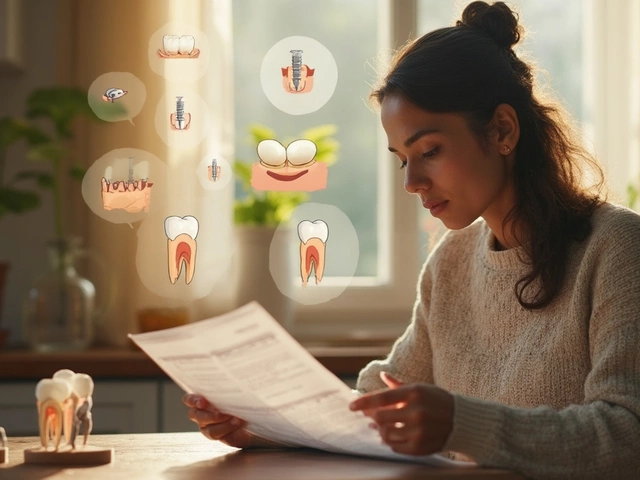When it comes to mental health, knowing which conditions are the most treatable can bring a lot of hope and guidance. Surprise, surprise, anxiety disorders actually top the list. Anxiety is not only common but fortunately, it's also one of the most responsive to treatment.
You might wonder, why anxiety? Well, it's often because a mix of both therapy and medications works wonders for many. Cognitive Behavioral Therapy (CBT), for instance, has shown impressive results in helping folks manage and reduce anxiety symptoms.
But therapy and meds aren't the whole picture. Small lifestyle tweaks also play a big role. Think regular exercise, mindfulness practices like meditation, or maybe just more consistent sleep. They all add up, trust me.
- Understanding Treatability
- Spotlight on Anxiety Disorders
- The Role of Therapy and Medication
- Lifestyle Changes for Recovery
- Seeking Help: What to Know
Understanding Treatability
So, what exactly makes a mental illness treatable? It's not just about the ease of making symptoms go away but more about how well we can manage and reduce them. Take anxiety disorders, for instance. They’re known to be highly treatable because the symptoms respond really well to treatments available today.
What Makes an Illness Treatable?
The treatability of a mental illness usually depends on a few key factors. These include how well the condition responds to therapy and medication, the availability of effective treatment methods, and how willing someone is to engage in treatment.
The Therapy and Medication Combo
For anxiety disorders, a combination of therapy and medication often works best. Those suffering from anxiety might find relief through mental health therapy approaches like CBT, which focuses on changing negative thought patterns. Medications such as SSRIs (Selective Serotonin Reuptake Inhibitors) are also commonly recommended alongside.
Statistics Speak
Did you know that around 70% of people who undergo treatment for anxiety see a significant reduction in their symptoms? That’s pretty impressive.
| Condition | Treatability | Common Treatments |
|---|---|---|
| Anxiety Disorders | High | CBT, SSRIs |
Your Role in Treatability
One thing that comes up often is the person’s role in their own treatment. Being proactive about reaching out for help and sticking with the treatment plan plays a huge role in how treatable a condition is. Sometimes, it's about staying the course, even when things feel tough.
Spotlight on Anxiety Disorders
So, why are anxiety disorders considered so treatable? It's partly due to the variety of options available to kick it to the curb. We're not talking quick fixes, but solutions that can make a real impact over time.
Understanding Anxiety Disorders
Anxiety disorders come in different shapes and sizes. Think Generalized Anxiety Disorder (GAD), Panic Disorder, and Social Anxiety Disorder, just to name a few. Each type might show up differently, but they all have some things in common, like persistent worry or fear.
Therapeutic Approaches
Therapy is often a go-to for managing anxiety. Cognitive Behavioral Therapy (CBT) is a front runner here. It teaches you to identify and change thought patterns that lead to anxiety. There's also Exposure Therapy, particularly useful for phobias and social anxiety.
Here’s a little tip: When choosing therapy, finding a therapist you click with can make all the difference in how effective treatment feels.
Medications that Help
Don't shy away from meds if your doc suggests them. Medications such as SSRIs and benzodiazepines can take the edge off. They’re not a cure but can help manage symptoms so you can focus on therapy and lifestyle changes.
The Role of Lifestyle Changes
- Exercise regularly to boost mood and reduce stress.
- Stick to a balanced diet to support overall well-being.
- Practice mindfulness or meditation to keep anxiety in check.
- Ensure you’re clocking enough sleep each night.
Lifestyle isn’t everything, but it’s a nice supporting act for other treatments.
Success Rates and Stats
| Type | Treatment Effectiveness |
|---|---|
| Generalized Anxiety Disorder | 60-80% |
| Social Anxiety Disorder | 50-70% |
| Panic Disorder | 70-90% |
These numbers aren't promises, but they show that with the right steps, managing anxiety is totally doable.

The Role of Therapy and Medication
When it comes to treating mental illnesses, especially ones like anxiety, a solid combo of therapy and medication can be a game changer. So how does this all work?
Therapies That Make a Difference
First off, cognitive-behavioral therapy (CBT) is a powerhouse in mental health therapy. It helps you spot and alter those pesky negative thought patterns that fuel anxiety. Imagine having a toolkit to tackle your worries; CBT is that toolkit.
Other therapies, like exposure therapy, get you to face fears head-on, helping take the edge off over time. Think of it like gradually dipping your toes into cold water until you're comfortable swimming.
Medications: A Helping Hand
Medications can sometimes get a bad rap, but let's be real—they can really help when used right. Selective serotonin reuptake inhibitors (SSRIs) and benzodiazepines are two common types for treating anxiety.
"Medications are like glasses for the brain. They don't fix the issue entirely but help you see the solution more clearly," says Dr. Tim Sharp, a clinical psychologist.
Usually, the goal with meds is to lift the fog just enough to engage in therapy effectively.
Finding the Balance
It's crucial to find the right balance that works for mental health therapy. Sometimes that means trying out different meds or therapists, and that's okay.
It's also about keeping communication open with your healthcare providers. They need to know what’s working and what's not so adjustments can be made.
Oh, and here's a stat that might encourage you: According to the American Psychological Association, about 75% of people who enter therapy show some benefit, especially when their treatment includes medications.
In short, while therapy sets the stage, medication sometimes supports the act. Together, they can lead to effective anxiety treatment.
Lifestyle Changes for Recovery
So, let's talk about how simple lifestyle adjustments can make a big difference when dealing with mental health issues, especially anxiety. Incorporating better habits into daily life can provide structure and help in managing symptoms effectively.
Move Your Body
Regular exercise might just be your new best friend. Not saying you need to become a gym rat, but even a 30-minute walk can reduce stress. Exercise triggers the release of endorphins, often called the "feel-good" hormones, which help alleviate anxiety and depression.
Eat Right
What you eat plays a big role in how you feel. Aim for a balanced diet that's rich in whole grains, lean proteins, and plenty of fruits and veggies. Foods like avocados, almonds, and blueberries are known to boost mood, so maybe give those a try.
Prioritize Sleep
Seriously, sleep is non-negotiable. It’s easier said than done, but getting 7-9 hours a night can make dealing with an anxiety disorder feel less like an uphill battle. Sleep and anxiety are closely linked, so consider setting up a bedtime routine that includes winding down with a book or soothing music.
Mindfulness and Relaxation
Mindfulness practices such as meditation or deep-breathing exercises can be life-changing. Just dedicating a few minutes each day can help clear your mind and maintain emotional stability.
Stay Social
One word: support. Connect with friends, family, or find a support group. Sharing experiences and feelings can ease the burden of anxiety and other mental illnesses.
If numbers are your thing, take a look at this table of foods and their impact on mood:
| Food | Mood Impact |
|---|---|
| Avocado | Rich in healthy fats, boosts brain function |
| Blueberries | Antioxidants to combat stress |
| Salmon | Omega-3 fatty acids for mood regulation |
Simple changes, big impact. Give them a shot if you're on a journey to recovery from a mental health therapy perspective. Consistency is key, and remember, small steps every day add up to significant change over time.

Seeking Help: What to Know
So, you're thinking about asking for help with your mental health. That's a huge step in the right direction. First off, congrats on recognizing the need for assistance. Seriously, that's huge.
When you're looking for support, start by pinpointing what you're dealing with. Whether it’s anxiety, depression, or another issue, knowing specifics helps in seeking the right kind of help. If you're not sure, a general practitioner is a great place to start. They can refer you to a specialist.
Choosing the Right Professional
When it comes to professionals, you have a few options. Therapists, psychologists, and psychiatrists all play different roles. Therapists conduct talk therapy, psychologists provide assessments and therapy, while psychiatrists can prescribe medication. Depending on your needs, you might work with one or several of these.
- Therapists: Great for regular emotional and guidance support.
- Psychologists: They help with diagnosing and offering therapies tailored to specific disorders.
- Psychiatrists: Essential if medication might be a necessary part of your treatment.
Practical Steps to Take
Alright, now for the nitty-gritty. Start by reaching out to services that fit your issues. Remember to check if they're accessible and covered by your insurance if that's relevant. It's also worth asking if they offer telehealth options, which is super convenient.
- Research potential therapists or mental health professionals in your area.
- Ask about their specialties to ensure they're a match for your needs.
- Schedule an initial consultation to see if their approach works for you.
- Don't hesitate to switch or try different professionals if you're not comfortable.
Helpful Stats
If you're curious about effectiveness, a study by the American Psychological Association found that around 60-80% of individuals notice an improvement in their anxiety symptoms with proper treatment.
Support Networks
Don’t forget about peer groups, whether they're offline or online, they can be super helpful. It’s like having a squad that's got your back.
Overall, finding the right help might take some trial and error, but it's crucial for managing and overcoming mental health challenges. Keep at it, trust the process, and don’t rush it.

 Do You Carry Your Own Baby with IVF?
Do You Carry Your Own Baby with IVF?
 How to Lose 20 Pounds in 3 Months: A Practical Guide
How to Lose 20 Pounds in 3 Months: A Practical Guide
 Dental Implants: What Are the Downsides You Need to Know?
Dental Implants: What Are the Downsides You Need to Know?
 Is Going to Mexico for Surgery Safe? What You Need to Know
Is Going to Mexico for Surgery Safe? What You Need to Know
 Affordable Wegovy Solutions: Discover $25 Monthly Deals through Online Pharmacies
Affordable Wegovy Solutions: Discover $25 Monthly Deals through Online Pharmacies